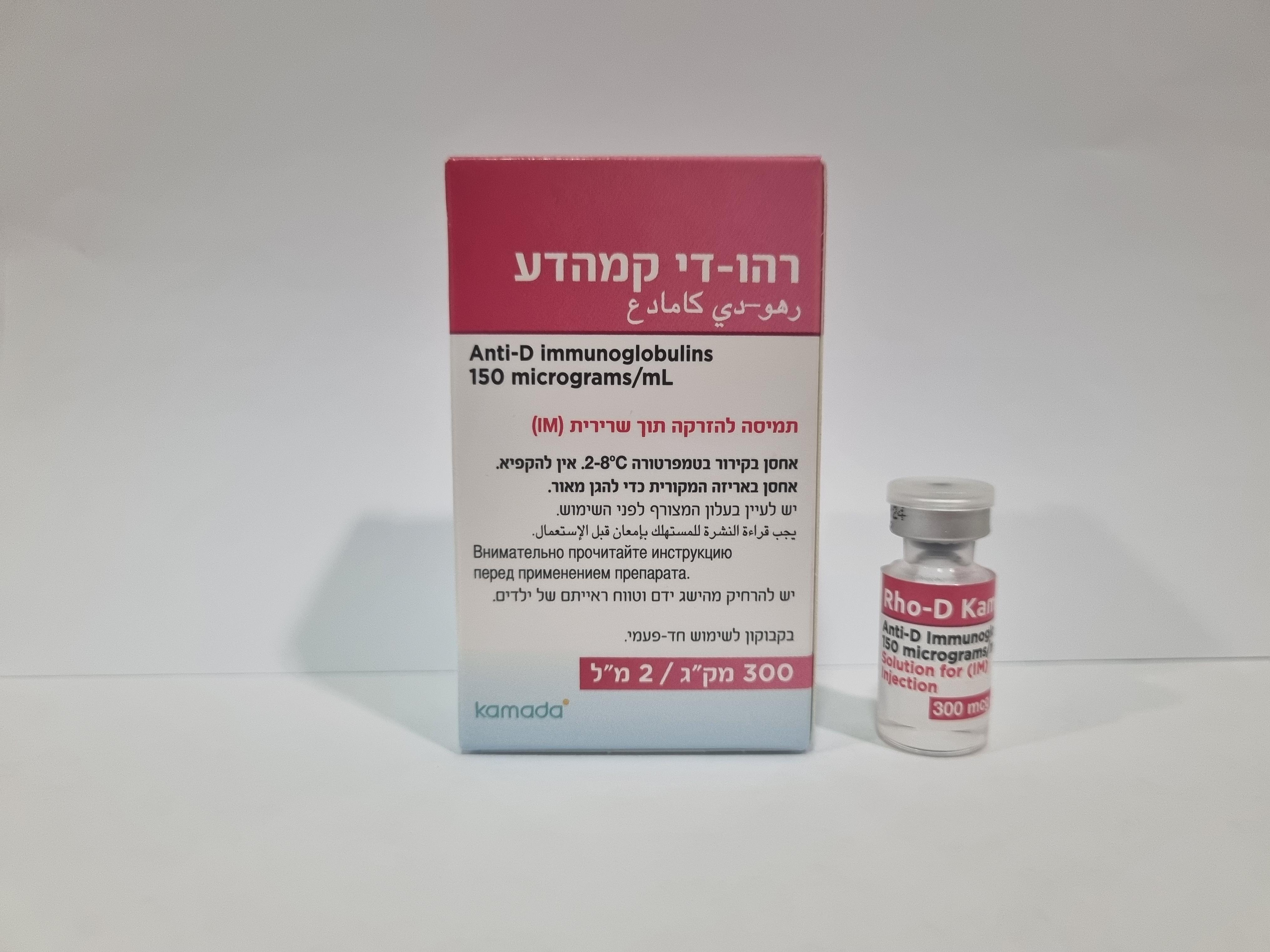Quest for the right Drug

רהו-די קמהדע RHO-D KAMADA (ANTI-D IMMUNOGLOBULINS)
תרופה במרשם
תרופה בסל
נרקוטיקה
ציטוטוקסיקה
צורת מתן:
תוך-שרירי : I.M
צורת מינון:
תמיסה להזרקה : SOLUTION FOR INJECTION
עלון לרופא
מינוניםPosology התוויות
Indications תופעות לוואי
Adverse reactions התוויות נגד
Contraindications אינטראקציות
Interactions מינון יתר
Overdose הריון/הנקה
Pregnancy & Lactation אוכלוסיות מיוחדות
Special populations תכונות פרמקולוגיות
Pharmacological properties מידע רוקחי
Pharmaceutical particulars אזהרת שימוש
Special Warning עלון לרופא
Physicians Leaflet
Special Warning : אזהרת שימוש
4.4. Special warnings and precautions for use Ensure that Rho-D Kamada is not administered into a blood vessel, because of the risk of shock. In the case of post-natal use, the product is intended for maternal administration. It should not be given to the new-born infant. Hypersensitivity True hypersensitivity reactions are rare but allergic type responses to anti-D immunoglobulin may occur. Rho-D Kamada contains a small quantity of IgA. Although anti-D immunoglobulin has been used successfully in selected IgA deficient individuals, individuals who are deficient in IgA have the potential for developing IgA antibodies and may have anaphylactic reactions after administration of plasma derived medicinal products containing IgA. The physician must therefore weigh the benefit of treatment with Rho-D Kamada against the potential risks of hypersensitivity reactions. Rarely, human anti-D immunoglobulin can induce a fall in blood pressure with anaphylactic reaction, even in patients who have tolerated previous treatment with human immunoglobulin. Suspicion of allergic or anaphylactic type reactions requires immediate discontinuation of the injection. In case of shock, standard medical treatment for shock should be implemented. Haemolytic reactions Patients in receipt of incompatible transfusion, who receive very large doses of anti-D immunoglobulin, should be monitored clinically and by biological parameters, because of the risk of haemolytic reaction. Thromboembolism Arterial and venous thromboembolic events including myocardial infarction, stroke, deep venous thrombosis and pulmonary embolism have been associated with the use of immunoglobulins. Although thromboembolic events have not been observed for Rho-D Kamada, patients should be sufficiently hydrated before use of immunoglobulins. Caution should be exercised in patients with pre-existing risk factors for thrombotic events (such as hypertension, diabetes mellitus and a history of vascular disease or thrombotic episodes, patients with acquired or inherited thrombophilic disorders, patients with prolonged periods of immobilisation, severely hypovolemic patients, patients with diseases which increase blood viscosity), especially when higher doses of Rho-D Kamada are prescribed. Patients should be informed about first symptoms of thromboembolic events including shortness of breath, pain and swelling of a limb, focal neurological deficits and chest pain and should be advised to contact their physician immediately upon onset of symptoms. Interference with serological testing After injection of immunoglobulin the transitory rise of the various passively transferred antibodies in the patient's blood may result in misleading positive results in serological testing. Passive transmission of antibodies to erythrocyte antigens, e.g. A, B, D may interfere with some serological tests for red cell antibodies, for example the antiglobulin test (Coombs' test) particularly in Rh(D) positive neonates whose mothers have received antenatal prophylaxis. Overweight/obese patients In overweight/obese patients, due to the possible lack of efficacy in case of intramuscular administration, an intravenous anti-D product is recommended. Transmissible agents Standard measures to prevent infections resulting from the use of medicinal products prepared from human blood or plasma include selection of donors, screening of individual donations and plasma pools for specific markers of infection and the inclusion of effective manufacturing steps for the inactivation/removal of viruses. Despite this, when medicinal products prepared from human blood or plasma are administered, the possibility of transmitting infective agents cannot be totally excluded. This also applies to unknown or emerging viruses and other pathogens. The measures taken are considered effective for enveloped viruses such as human immunodeficiency virus (HIV), hepatitis B virus (HBV) and hepatitis C virus (HCV). The measures taken may be of limited value against non-enveloped viruses such as hepatitis A and parvovirus B19. There is reassuring clinical experience regarding the lack of hepatitis A or parvovirus B19 transmission with immunoglobulins and it is also assumed that the antibody content makes an important contribution to the viral safety. It is strongly recommended that every time that Rho-D Kamada is administered to a patient, the name and batch number of the product are recorded in order to maintain a link between the patient and the batch of the product.
Effects on Driving

שימוש לפי פנקס קופ''ח כללית 1994
Prevention of sensitization of an Rh-negative mother who delivers an Rh-positive child, or after abortion
תאריך הכללה מקורי בסל
01/01/1995
הגבלות
תרופה שאושרה לשימוש כללי בקופ'ח
מידע נוסף
